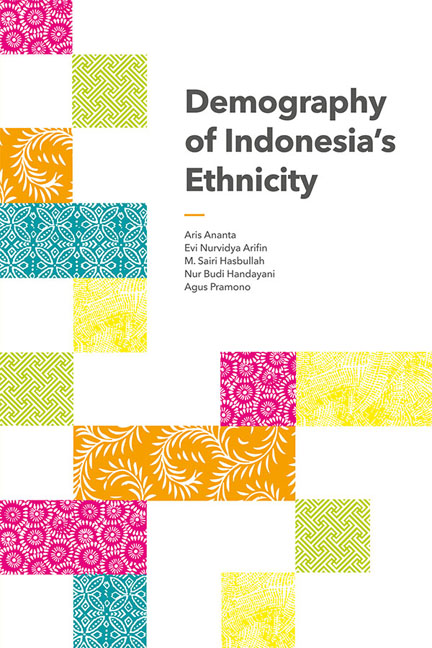Book contents
- Frontmatter
- Contents
- List of Tables
- List of Figures
- Foreword
- Acknowledgements
- 1 CHANGING INDONESIA: An Introduction
- 2 COMPLEXITY OF STATISTICS ON ETHNICITY: Concept, Data and Method of Analysis
- 3 THE NEW CLASSIFICATION: Uncovering Diversity
- 4 ETHNIC DIVERSITY: New Demographic Evidence
- 5 THE FIFTEEN LARGEST ETHNIC GROUPS: Age-Sex Structure and Geographical Distribution
- 6 CHANGE IN SIZE AND COMPOSITION OF ETHNIC GROUPS: Indonesia, 2000–2010
- 7 RELIGION AND LANGUAGE: Two Important Ethnic Markers
- References
- Appendix 1
- Appendix 2
- Index
- About the Authors
Foreword
Published online by Cambridge University Press: 10 October 2017
- Frontmatter
- Contents
- List of Tables
- List of Figures
- Foreword
- Acknowledgements
- 1 CHANGING INDONESIA: An Introduction
- 2 COMPLEXITY OF STATISTICS ON ETHNICITY: Concept, Data and Method of Analysis
- 3 THE NEW CLASSIFICATION: Uncovering Diversity
- 4 ETHNIC DIVERSITY: New Demographic Evidence
- 5 THE FIFTEEN LARGEST ETHNIC GROUPS: Age-Sex Structure and Geographical Distribution
- 6 CHANGE IN SIZE AND COMPOSITION OF ETHNIC GROUPS: Indonesia, 2000–2010
- 7 RELIGION AND LANGUAGE: Two Important Ethnic Markers
- References
- Appendix 1
- Appendix 2
- Index
- About the Authors
Summary
It is a great pleasure for me to write this foreword. Firstly because I have known Evi and Aris for many years and regard them as dear friends as well as important and gifted Indonesian scholars. However, the ethnic diversity of Indonesia has always been part of my research in the country. Ever since I found the treasure trove of ethnicity data in the 1930 Dutch-applied Volkstelling, I was hooked on following the important interactions between ethnicity and politics and the threats to it of attempts to rationalize Indonesian “culture”, language etc. As a geographer, too, the spatial complexity of the heartlands of the various ethnolinguistic groups was fascinating. One of my great disappointments with the censuses of 1961, 1971, 1980 and 1990 was that they did not include an ethnicity question because of its sensitivity during a period when governments encouraged national Indonesian identification over ethnic-regional associations. However, this has fortunately changed. The 2000 census data was excellently analysed by Evi, Aris and Leo Suryadinata. As Professor Widjojo Nitisastro, one of Independent Indonesia's greatest economists and social scientists, said in his foreword to the volume, this study will see a flourishing of more ethnicity-based studies in Indonesia, and it certainly has.
Turning to the new study based on the 2010 census, Evi and Aris have been joined by three new co-authors — M. Sairi Hasbullah, Nur Budi Handayani and Agus Pramono — all from the BPS (Badan Pusat Statistik/Statistics – Indonesia). The latter have certainly added a significant understanding of the measurement of ethnicity in Indonesia and the ways in which they have been classified and the methods used to meaningfully aggregate small-sized groups into ethnic and sub-ethnic groups. A distinctive feature of the book is the development a new classification of ethnicity in Indonesia which reclassifies the 1,331 coded separate ethnicities into 600 ethnic groups and two excellent recommendations have been made to BPS to refine this further for the next census. The book contains the most detailed account of concepts, collection methods, data definition and methods of analysis that has yet been written and is to be highly recommended to scholars in this area.
The new classification will excite much discussion among scholars in this area. The choices are justified in Chapter 3. The new classification is tabled alongside the equivalent initial classification group for each province.
- Type
- Chapter
- Information
- Demography of Indonesia's Ethnicity , pp. xv - xviPublisher: ISEAS–Yusof Ishak InstitutePrint publication year: 2014

